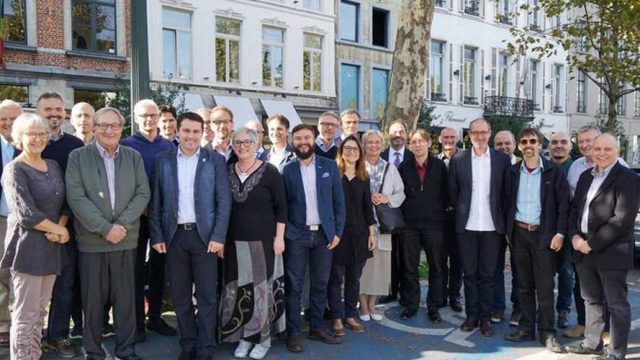President emphasizes mission-driven approach during Year-End Meeting Report

Daniel R. Jackson, president of the Seventh-day Adventist Church in North America, during the first business session of the 2017 North American Division (NAD) Year-End Meeting, declared that the church’s education and health care systems are the number one outreach, after acknowledging all the college and university students in the audience. He announced that a major focus for 2018 will be a coordinated mission-driven approach with unions, conferences, higher education, and health care.
“Health care is important, but we shouldn’t consider education as secondary,” said Jackson. “Our hospitals and our school system are the church. We have talked a lot about collaboration, and we will continue.” Jackson explained that his report this year is themed “New Perspectives — Collaboration 3.0.”
After beginning his report with the NAD’s mission, “To reach everyone in the North American Division with the Christ-centered message of Hope and Wholeness,” Jackson shared a roadmap of the past five years. The map started with the development of the “Hope & Wholeness” theme and REACH values (2011); the unveiling of the NAD strategic plan and welcome to Guam-Micronesia as a mission conference of the NAD (2012); the welcome of Oakwood University and Pacific Press Publishing Association (PPPA) as division entities (2014); the release of the book Mission-Driven Church (2015); and the welcome of Christian Record Services, Inc. as an NAD entity as well as the major effort to plant 1,000 new churches in five years (2016).
“One thousand churches in five years . . . Unless the church of Jesus is aggressive in mission it isn’t doing its job,” said Jackson. He acknowledged, with the acquisition of PPPA and closing of the Review and Herald Publishing Association, and the restructuring of the Adventist Media Center, that “there are hard decisions that have to be continually made in order to maintain mission.”
The Road Ahead
Jackson transitioned to a road map of the next three years, starting with 2017 and the opening of the new NAD headquarters. [Click here for an interview with Jackson.] The NAD moved into the Columbia, Maryland, building on Sept. 18, and held a grand opening ceremony and dedication the morning of Oct. 26. [Click here to read about the event.]
A coordinated mission-driven approach started in the NAD offices and entities in 2017; 2018 will see that approach continued with colleges and universities, health care institutions, unions, and local conferences; 2019 will focus on churches, schools, and other institutions; and 2020 will see these visions, through Christ, realized.
“All that we do should be Christ-centered,” said Jackson. Remembering the early church, he said, “We need to start seeing ourselves again as a movement. This movement is based upon the gospel of Jesus Christ. It is not based upon tofu.”
Mission With 2020 Vision
With the distribution of the 85-page 2020 Vision NAD strategic plan book, Jackson once again reiterated the importance of mission. Each of the 49 NAD ministry departments and entities disclose the goals they hope to achieve by 2020.
According to the book, the division’s administration has set a top three strategic imperatives leading up to 2020. These are 1) communicating more effectively with the more than 300 million residents and 1.2 million church members in the division; 2) engaging the next generation of youth and young adults in church life and work, and providing opportunities for positive change; and 3) helping pastors and church administrators accomplish excellence in leadership.
“We have not forgotten our other missional initiatives,” reassured Jackson. “They are still important and we are still carrying through with them.” Jackson described the work already done in these areas and shared on-going plans in the six initiatives: transformational evangelism, young adult life (engaging the next generation), women in pastoral ministry, emerging immigrant populations, stewardship, and social media and big data analysis.
Strengths in the NAD
In his report, Jackson also shared what he terms “our strengths” in the North American Division. These include our Great God, great human resources, excellent facilities, active laity, able youth, and generous constituencies.
With Breath of Life speaker/director Carlton Byrd, Southern Union Conference president Ron Smith, NAD Ministerial Association associate director Jose Cortes Jr., and NAD executive secretary G. Alexander Bryant called on stage, Jackson briefly highlighted several public evangelism events: a Breath of Life event where 97 were baptized and a church was planted in Las Vegas, Nevada, just after the mass shooting; 100 baptized in a Southern Union evangelism effort; the Caravan of Hope in New Jersey, where 305 people were baptized in one day in June; and an event with Bryant, in Birmingham, Alabama, where more than 40 people were baptized.
Said Jackson, “Evangelism still does work. It’s not just 28 nights in a hall, there are all kinds of methods, ways to reach others.”
The Compassion Movement, started by the division’s Ministerial Association, has caught fire across the division, Jackson said, giving example after example of churches and members engaged in community outreach. Jackson mentioned the needs of Somali refugees in Minnesota being met by church leaders and members in that area, and the British Columbia, Canada, Church in the Valley, which has a climbing wall in the church, operates a garage for car repairs, and completely renovates each year one community member’s home for free.
Another highlight included the work done on NAD college campuses. Jackson recognized specifically the 2017 Choir of the World win for the Oakwood University Aeolians, La Sierra’s continued success with mission-minded business and Enactus competitions, and the contributions of Andrews University students and faculty in this year’s Nobel Prize in Physics.
The Church, Change, and God’s Presence
More than halfway through his report Jackson displayed a photo of the Choluteca Bridge in Honduras. In 2015, a tropical storm swept through Honduras, causing significant destruction. The bridge stood strong, said Jackson, but the river changed its course.
“The world is changing and the church could become just like that bridge,” said Jackson. If the church’s mission isn’t directly meeting people’s needs, it must find out what and where those needs are and answer them. “We are compelled by the gospel of Jesus, the call of Jesus,” he said. “God’s work must be relevant to the days in which we live.”
Jackson recited Luke 9:61-62 as both an encouragement and a recognition that the church has a mandate from God, and it will not always be easy to do the work.
But he is heartened by the generation before him, which he believes will finish the work. “It won’t be my generation,” he said. “It will be this generation. I’m praying that God’s spirit will fall on us and that we will be lead,” he said. “We must let Him guide us.”
Jackson concluded: “Plead for the in-filling of the Holy Spirit. . . . We need His presence daily. We need to have His presence at this time.”





